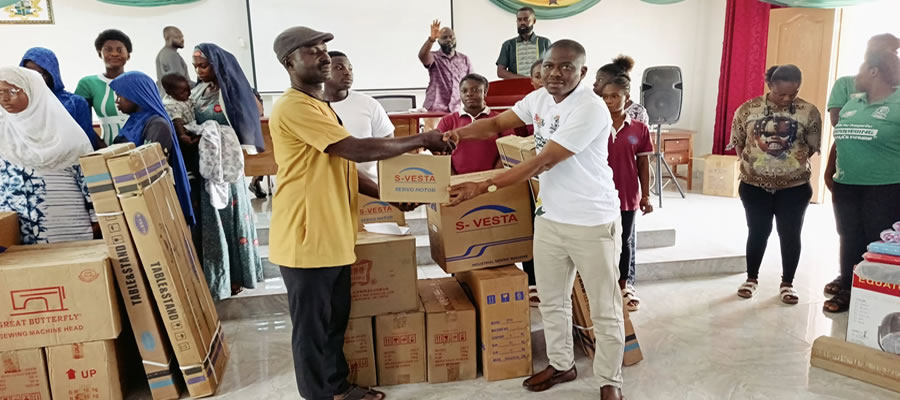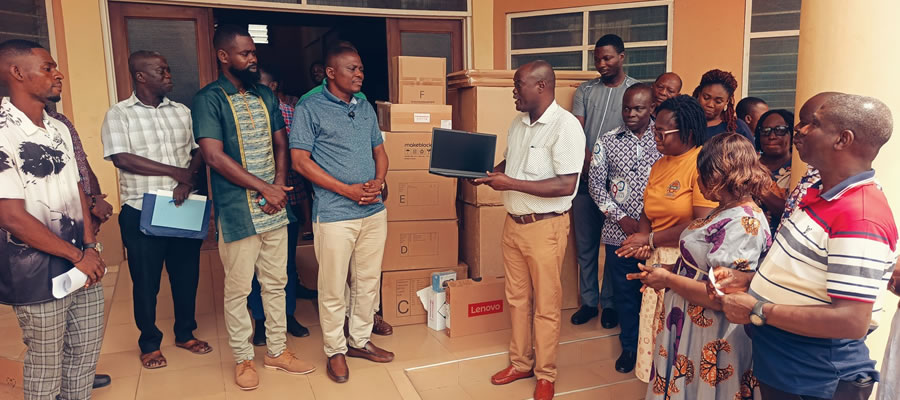

Water
The availability of potable water is very vital for the socioeconomic development of every society. Major sources of water supply in district include pipe borne water, boreholes, wells, streams and rivers.
Pipe borne water is mostly concentrated in Akim Swedru, the District Capital and few area councils centers and communities such Aperade which operate small town water systems. Boreholes, wells, and streams/rivers are dominant in the rural areas.
Boreholes and wells are also available urban areas as supplement due to inadequate and unreliable pipe borne water supply. This is attributed to capacities of equipments and the fact that some of the facilities are either very old or broken down. The situation is even aggravated by the high rate of expansion in the district capital and other urban centers.
There is therefore the need to extent pipe borne water to growing communities with population above the threshold of borehole facilities. A typical example is Akim Achiase which is under Ghana water company but never enjoy the facility. Generally the current potable water coverage in district is 50%.
The District Assembly in collaboration with Community Water Sanitation Agency with support from donors such as KFW and DANIDA has over the past years drilled several boreholes in the district.
Problems facing the water sector include management (operation and maintenance) of these facilities especially in the rural areas. There is low patronage of small town water systems due the operation of private H.D.Ws whose qualities are not guaranteed. There is therefore need to intensify public education on the use of water from approved sources to prevent the incidence of water borne diseases
Sanitation
The District in an attempt to improve the general waste management acquired six (6) acres of land at Aduasa which has been developed by the Zoomlion Ghana limited. Three (3) acres is being used for solid waste management and the rest for liquid waste management.
Notwithstanding this development, most of the refuse dumps have developed into severe eye-sore monuments partly due to the act of crude dumping. Frequent breakdown of the already ill-provided wheel barrow is compounding the challenges and lack of cesspit emptier.
Most drains are unclean and defective coupled with inhabitants crudely dumping refuse into them. But with constant education they are positively responding to; thereby changing their attitude gradually.
The District Environmental unit in collaboration with Zoomlion regularly administered refuse collection for onward disposal from markets, lorry parks and other public centers.
Achievements of the unit are as follows:
- Six (6)refuse dumps have been evacuated by Zoom lion Ghana Limited
- Ten successful clean up exercises have been undertaken in the District
- Stray animals are being held in check by the construction of a public pound at the district Capital
- Vigorous hygiene and sanitation education is gradually making communities environmentally conscious
- One thousand three hundred (1300) food vendors were medically screened and declared fit
- District Environmental Sanitation Strategic and Action Plan (DESSAP) have been prepared.
- The following are therefore being identified as problems facing the Environmental Sanitation in the District.
- Inadequate sanitary tools and lack of Emptier
- Inadequate refuse containers
- The unit has no vehicle for monitoring
- Failures of owners of residential and other habitable facilities to construct toilet facilities is putting undue pressure on the unavailable public latrines
Natural Environment
With respect to natural environment, several educational programmes were lined up in the plan for farmer, firewood producers, sellers and users. However the implementation of these has been on a lower side. Under the community forestry management programme, the forestry division of the Assembly in collaboration with MOFA has been working tirelessly to sensitize the people in the district on the need to get involve in afforestation to support the afforestation programme of the government.
The Tunga forestry strategy has been adopted as planned and this is helping to revive the lost forest.
The forestry division made an attempt to register and control the firewood operators but only few were registered. However the District Assembly is making effort to clump down in these people to reduce their activities.
Regarding physical development control, it has been realized that even though settlement planning in schemes have been developed in selected towns, little has been done to support and strengthen the building inspectorate unit and the statutory planning committee of the Assembly as indicated in the plan. The problem of haphazard development due to poor monitoring and education still exist.
Date Created : 11/24/2017 1:43:03 AM












 facebook
facebook
 X
X
 Youtube
Youtube
 instagram
instagram
 +233 593 831 280
+233 593 831 280 0800 430 430
0800 430 430 GPS: GE-231-4383
GPS: GE-231-4383 info@ghanadistricts.com
info@ghanadistricts.com Box GP1044, Accra, Ghana
Box GP1044, Accra, Ghana